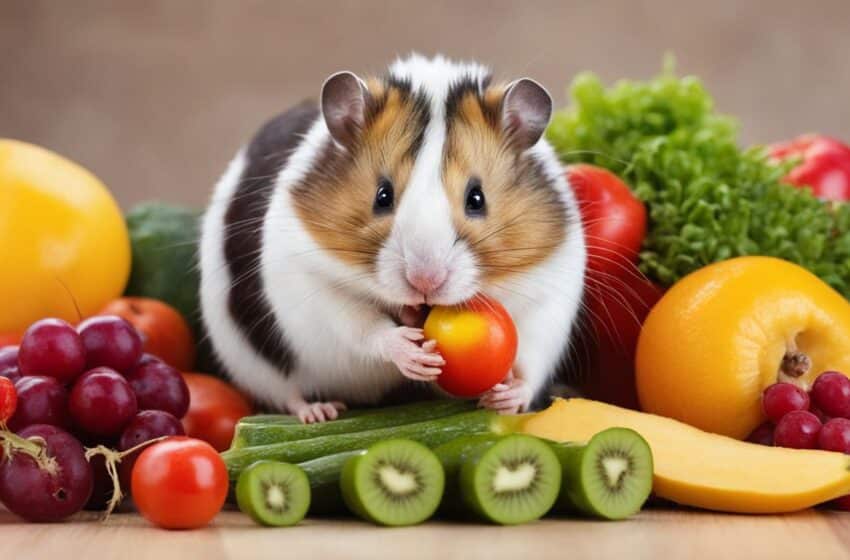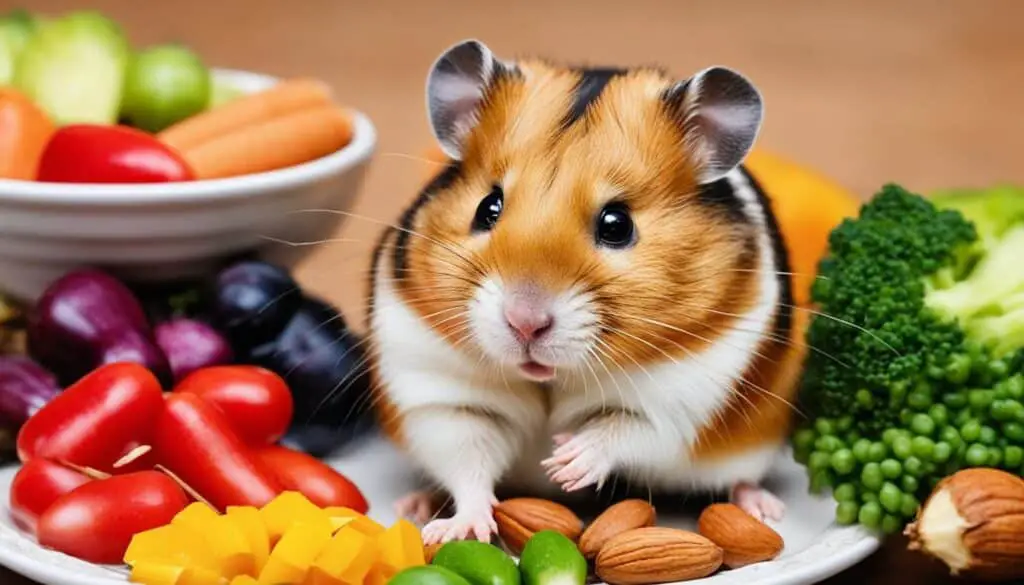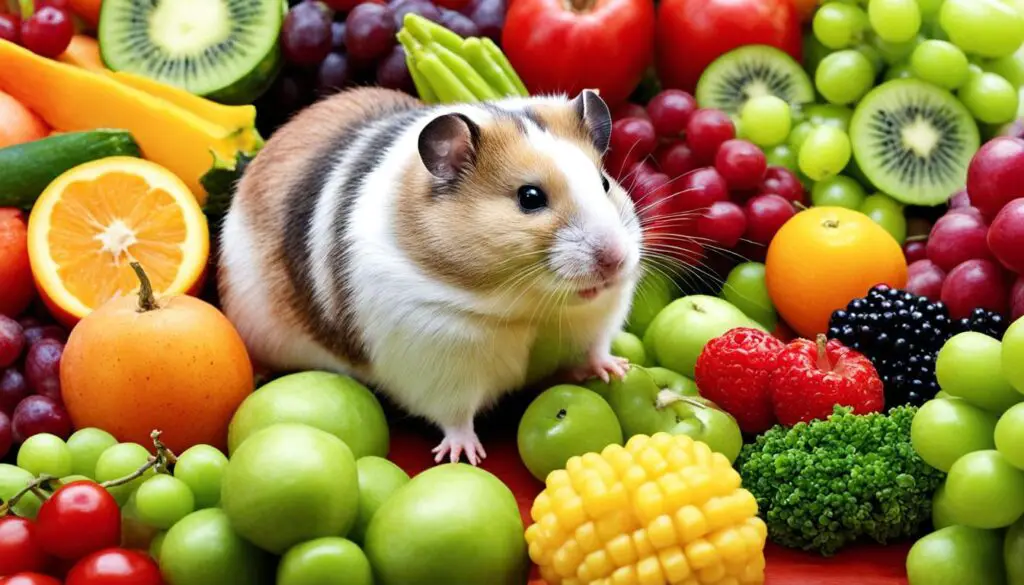Caring for Elderly Hamsters: Nutritional Needs

As a responsible pet owner, I understand the importance of caring for our elderly hamsters and meeting their specific nutritional needs. Just like humans, aging hamsters require a balanced diet to maintain their health and well-being. By providing them with the right nutrients, we can ensure that they stay vibrant and thrive in their golden years.
Key Takeaways:
- Elderly hamsters have specific nutritional needs that must be met for their health.
- Aging hamsters require a balanced and tailored diet.
- A proper diet can prevent health issues and improve their overall quality of life.
- Feeding tips for elderly hamsters include offering a variety of food options and monitoring their weight.
- By caring for their nutritional needs, we can help our elderly hamsters live a vibrant and fulfilling life.
Nutritional Requirements of Elderly Hamsters
As hamsters age, their nutritional needs change, requiring a diet that is tailored to their specific requirements. Senior hamsters need a balanced diet that supports their overall health and well-being. To ensure their nutritional needs are met, it’s important to provide foods that are rich in fiber, protein, and antioxidants.
Fiber is essential for hamsters’ digestive health, helping to prevent constipation and other digestive problems commonly experienced by aging hamsters. Good sources of fiber include Timothy hay, fresh leafy greens, and vegetables like carrots and broccoli.
Protein is important for maintaining muscle mass and supporting various bodily functions in aging hamsters. High-quality protein sources for senior hamsters can include cooked chicken, boiled eggs, and specially formulated senior hamster food.
Antioxidants, such as vitamin C and vitamin E, can help support the immune system of aging hamsters. Fresh fruits like apples and berries, as well as vegetables like bell peppers and spinach, are rich in antioxidants and can be included in their diet.
It’s also crucial to consider the texture of the food for elderly hamsters. As they may have dental issues or difficulty chewing, providing soft or easily chewable foods is important. Diced vegetables, cooked pasta, or softened pellets can be offered to ensure they can easily consume their meals.
Here is a table showcasing examples of foods that are suitable for the diet of elderly hamsters:
| Food Group | Examples |
|---|---|
| High-Fiber Foods | Timothy hay, kale, carrots, broccoli |
| Protein Sources | Cooked chicken, boiled eggs, senior hamster food |
| Antioxidant-Rich Foods | Apples, berries, bell peppers, spinach |
| Soft/Easily Chewable Foods | Diced vegetables, cooked pasta, softened pellets |

“As hamsters age, it’s important to provide them with a diet that meets their specific nutritional needs. A well-balanced diet rich in fiber, protein, and antioxidants can support their overall health and well-being.”
Health Benefits of a Proper Diet for Aging Hamsters
A proper diet plays a crucial role in maintaining the health and well-being of elderly hamsters. Providing a nutritionally balanced diet can have numerous benefits and help address specific health concerns commonly seen in aging hamsters.
One of the key benefits of a senior hamster diet is the prevention of obesity. As hamsters age, their metabolism slows down, making them more prone to weight gain. A well-balanced diet, consisting of appropriate portion sizes and a mix of essential nutrients, can help prevent excessive weight gain and keep your hamster at a healthy weight.
Dental problems are another common issue in aging hamsters. Chewing on hard objects and consuming tough foods can be challenging for them. By providing a diet that includes soft pellets and foods that are easy to chew, you can help protect their dental health and prevent potential dental issues.
Proper nutrition also plays a significant role in maintaining digestive health for elderly hamsters. As hamsters age, their digestive system becomes more delicate, making them susceptible to digestive problems. A diet rich in fiber, from fresh fruits and vegetables, can promote healthy digestion and prevent constipation.
Beyond preventing specific health issues, a nutritious diet can have a positive impact on the overall well-being of aging hamsters. A balanced diet can boost their immune system, helping them fight off illnesses and infections. It can also provide them with essential vitamins, minerals, and antioxidants that support their overall health and contribute to their longevity.
The importance of nutrition for elderly hamsters cannot be overstated. By prioritizing their diet and providing them with the right nutrients, you can significantly enhance their quality of life, ensuring they remain active, vibrant, and happy throughout their golden years.

| Benefits of a Proper Diet for Aging Hamsters |
|---|
| Prevents obesity |
| Promotes dental health |
| Supports digestive health |
| Boosts immune system |
| Improves overall well-being |
Feeding Tips for Elderly Hamsters
Properly feeding your aging hamster is essential to meet their specific needs and ensure their overall well-being. Consider these feeding tips to provide the best care for your senior hamster:
Variety of Food Options
When it comes to feeding elderly hamsters, offering a variety of food options is crucial. This helps provide them with a well-rounded diet and prevents monotony. Include a mix of fresh fruits, vegetables, and specially formulated senior hamster food. This variety ensures they receive essential nutrients and keeps their taste buds satisfied.
Fresh and Clean Water
Ensuring that fresh and clean water is always available is vital for the hydration and proper digestion of senior hamsters. Replace the water daily and clean their water dispenser regularly to maintain hygiene. Regularly monitoring their water intake is also important, as elder hamsters may have specific requirements due to health conditions.
Monitor Weight and Adjust Portion Sizes
As hamsters age, their metabolism and activity levels may change. It’s essential to monitor their weight and adjust their portion sizes accordingly to prevent overfeeding or underfeeding. Consult with your veterinarian to determine the appropriate amount of food for your aging hamster based on their weight, health condition, and activity level. This helps maintain their ideal body condition and overall health.
Consider Dental Health
Senior hamsters may experience dental issues such as tooth loss or overgrowth. Providing appropriate foods that are easy to chew can help prevent further complications. Opt for soft treats and food options that are gentle on their teeth while still meeting their nutritional needs. Regularly monitor their dental health and consult your veterinarian if you notice any signs of discomfort or difficulty eating.
| Feeding Tips for Elderly Hamsters |
|---|
| Provide a variety of food options |
| Ensure fresh and clean water |
| Monitor weight and adjust portion sizes |
| Consider dental health |
By following these feeding guidelines for aging hamsters, you can support their health and well-being, ensuring they enjoy their golden years to the fullest.
Conclusion
Properly caring for elderly hamsters and ensuring they receive the right nutrition is essential for promoting their health and well-being in their golden years. By providing a balanced and tailored diet, you can help prevent potential health issues and increase their longevity.
As responsible pet owners, it is imperative to prioritize their diet and make necessary adjustments to meet their specific nutritional needs. A diet rich in fiber, protein, and antioxidants is important for their overall health. Additionally, offering a variety of fresh fruits, vegetables, and specially formulated senior hamster food can help ensure they receive vital nutrients.
Feeding practices should also be monitored. Regularly assess their weight and adjust portion sizes accordingly to prevent overfeeding or underfeeding. It is equally important to monitor their dental health and provide them with foods that are easily chewable. By meeting their nutritional needs and promoting their overall health, you can ensure that your elderly hamster lives a vibrant and fulfilling life.
FAQ
What are the nutritional requirements of elderly hamsters?
Elderly hamsters have different nutritional needs compared to younger hamsters. Their diet should be balanced and tailored to their specific needs. A diet rich in fiber, protein, and antioxidants is important for their overall health. Foods that are easy to chew and digest should be prioritized. Providing a variety of fresh fruits, vegetables, and specially formulated senior hamster food can help meet their nutritional requirements.
What role does a proper diet play in the health of aging hamsters?
A proper diet plays a crucial role in maintaining the health and well-being of elderly hamsters. Providing a nutritionally balanced diet can help prevent certain health issues commonly seen in aging hamsters, such as obesity, dental problems, and digestive issues. A healthy diet can also boost their immune system, promote longevity, and improve their overall quality of life.
How can I ensure I am feeding my elderly hamster properly?
When feeding elderly hamsters, it is important to consider their individual needs and preferences. Offering a variety of food options and ensuring fresh, clean water is always available is essential. Monitoring their weight and adjusting their portion sizes accordingly can help prevent overfeeding or underfeeding. Regularly monitoring their dental health and providing appropriate foods that are easy to chew can also contribute to their overall well-being.
Why is it important to meet the nutritional needs of elderly hamsters?
Meeting the nutritional needs of elderly hamsters is vital for their health and well-being. Providing a balanced diet tailored to their specific needs can help prevent health issues and promote longevity. Responsible pet owners should prioritize their hamster’s diet and make adjustments as necessary to ensure they are receiving optimal nutrition. By caring for their nutritional needs, you can help your elderly hamster live a vibrant and fulfilling life.



